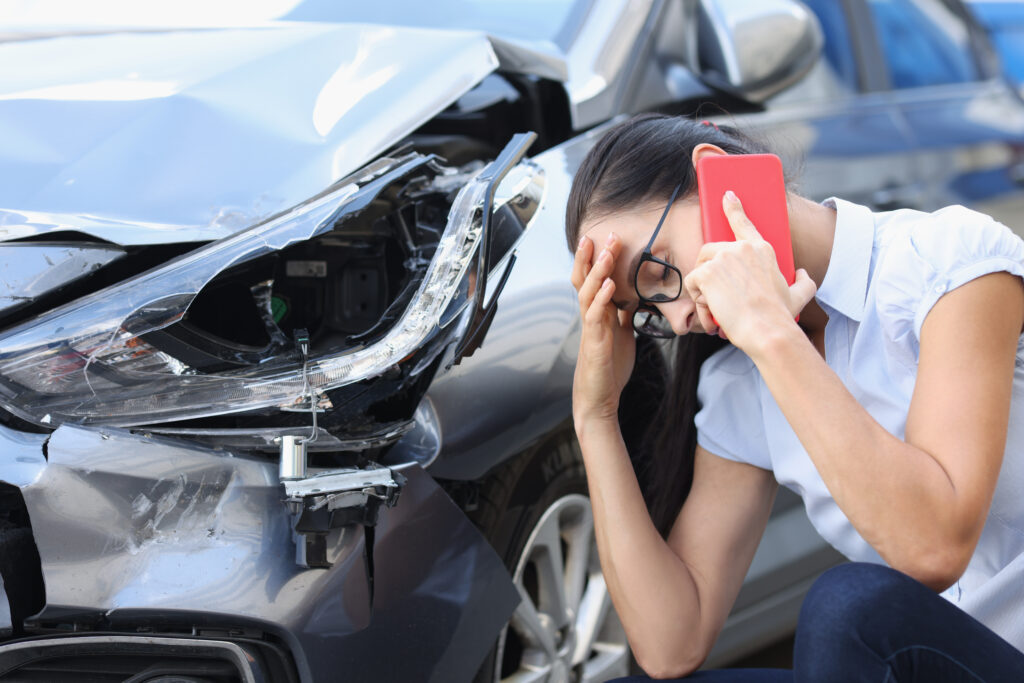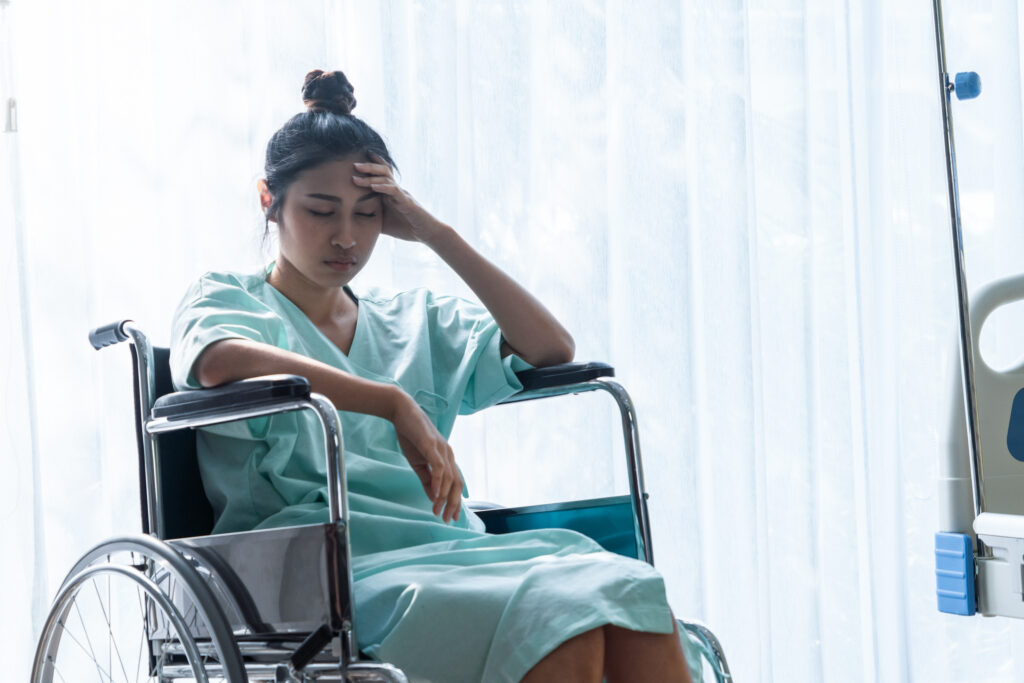LET OUR VIRGINIA CAR ACCIDENT ATTORNEYS HELP YOU MOVE FORWARD
Contact our firm now online or by phone at (804) 644-1400 to schedule a free accident case evaluation with our Richmond car accident attorneys.
If you have been in a car accident, you may experience nausea. Nausea and vomiting are common after an accident and can occur due to many factors. This blog post will discuss the causes of nausea after a car accident and how to treat it.
The car accident attorneys with Cantor Grana Buckner Bucci will be here for you if you need help obtaining compensation for a car wreck caused by another’s negligence. Car accident victims turn to us regularly because they know we’ll fight passionately for their rights. Please contact one of our experienced personal injury attorneys as soon as possible for a free consultation.
Possible Causes of Nausea and Vomiting after a Car Accident
There are many possible causes for nausea and vomiting after an auto accident. Some of the most common include:
– Traumatic brain injury: A traumatic brain injury can cause nausea and vomiting, as well as other symptoms like headache, confusion, and dizziness. If you have any reason to believe this has happened to you, it will be essential that you seek immediate medical attention. Traumatic brain injuries can result in long-term, debilitating symptoms, so get help right away.
– Concussion: A concussion is a type of head injury that can cause nausea and vomiting. Symptoms usually occur within the first 24 hours after the injury.
– Whiplash: Whiplash is a type of neck injury that can cause nausea and vomiting in addition to severe neck pain. It typically occurs when the head is suddenly thrust forward and then backward.
– Gastrointestinal problems: After a car accident, you may experience gastrointestinal problems such as diarrhea or constipation, leading to nausea and vomiting. In some cases, internal bleeding can cause nausea and require medical help immediately.
– Dehydration: Dehydration is a common complication of an automobile accident. It can cause nausea and vomiting and other symptoms like dizziness and weakness.
If you are experiencing car accident nausea and vomiting, please get medical attention as soon as possible. The underlying cause of your symptoms may need to be treated. Treatment for nausea and vomiting will vary depending on the cause but may include medications or IV fluids.
In some cases, surgery may be necessary to treat the serious injuries sustained in a car accident. If you are considering surgery, make sure to discuss all of your options with your doctor, and they can help you decide if surgery is the best course of treatment for you.
What to Do if You’re Nauseous After a Car Accident
If you are experiencing nausea after a car accident, you can do a few things to help relieve your symptoms.
– Drink plenty of fluids: Dehydration is a common complication of car accidents. It can cause nausea and vomiting and other symptoms like dizziness and weakness. Drink plenty of fluids to stay hydrated.
– Eat light, bland foods: If you are having trouble keeping food down, try eating light, bland foods like toast or crackers.
– Get rest: When you’re feeling nauseous, it’s important to get plenty of rest. This will help your body heal and reduce the chance of further complications.
If your nausea persists for more than a few days after the car accident, or if you are experiencing other symptoms like fever or diarrhea, seek medical attention. You may have a more serious injury that requires treatment.

What Kind of Medical Treatment is Available for Nausea?
Medical treatment is available if you are experiencing nausea after a car accident. The type of treatment will depend on the underlying cause of your symptoms.
– Head injury: A head injury can be treated with medications like ibuprofen or acetaminophen to reduce inflammation and pain. You may need to wear a helmet for protection if you have a concussion. In some cases, surgery may be necessary to repair the damage done to the brain.
– Concussion: A concussion can usually be treated with rest and time. However, in some cases, medication or therapy may be needed.
– Whiplash: Whiplash can often be treated with physical therapy or chiropractic care. In severe cases, surgery may be necessary.
– Gastrointestinal problems: If you are experiencing gastrointestinal problems, medications like antibiotics or antacids may help. In some cases, surgery may be necessary to correct the problem.
– Dehydration: Dehydration can be treated with fluids and electrolytes. In severe cases, a hospital stay may be required.
If you are considering surgery for car accident injuries, make sure to discuss all of your options with your doctor. He or she can help you decide if surgery is the best course of treatment for you.
Why You Should Not Wait to Seek Medical Attention After a Car Accident
If you are experiencing nausea after a car accident, it is important to seek medical attention. The underlying cause of your symptoms may need to be treated. Treatment for nausea and vomiting will vary depending on the cause but may include medications or IV fluids.
Not waiting to seek medical attention after a car accident is important. Delaying treatment can lead to further complications and may even delay your recovery. If you are experiencing any symptoms after a car accident, seek medical attention right away. You may have a more serious injury that requires treatment.
Delayed-Onset Injuries After a Car Accident
Car accidents can cause various injuries that may not appear immediately after the accident. These delayed-onset injuries can often be more serious than those evident at the time of the accident.
In many cases, an underlying injury can often go undetected and lead to further complications if left untreated. Don’t wait to get help – it could save your life.

How Long Does it Take to Recover from Post-Accident Nausea?
Nausea after a car accident can take a few days to resolve, and it may persist for weeks or even months in some cases. If other symptoms like fever or diarrhea accompany your nausea, seek medical attention right away. You may have a more severe injury that requires treatment.
How an Attorney Can Help You Obtain Compensation After a Car Accident
If you are experiencing nausea after a car accident, an attorney can help you obtain compensation for your injuries. He or she will work with the insurance company to get you the money you need to pay for medical treatment and other expenses related to your car accident.
Don’t wait – contact an attorney today to get started on your case.

Types of Evidence Your Attorney Can Gather After a Car Accident
If you are experiencing nausea after a car accident, your attorney can gather evidence to support your case. This evidence may include medical records, police reports, and witness statements. An attorney will use this information to build a strong case for you and help you obtain the compensation you deserve.
Please don’t hesitate to contact Cantor Grana Buckner Bucci to learn more about how we may be able to help. Contact us as soon as you can for a free consultation of your case.












